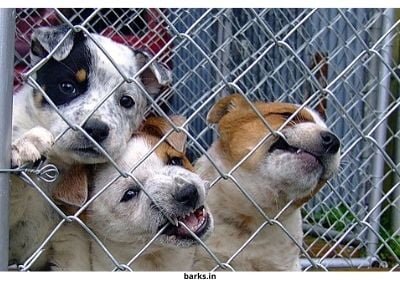What is a puppy mill?
A puppy mill is a dog breeding unit run by backyard breeders purely for making a profit. Puppy mills or puppy farms have no regard for the welfare of dogs. They exploit dogs and breed them in sheds and deprive them of love and even basic care.
Simply put, a puppy mill (also called a puppy farm) is a dog breeding facility that focuses on producing as many puppies as possible with no regard for the dog’s mental or physical health.
With the demand for puppies skyrocketing, puppy mills exist in every nook and corner of India. Since profit is their motive, puppy mills don’t provide any care for their dogs.
They operate like mini-factories that continually focuses on producing more and more puppies. To keep their costs low and reduce their overheads, they don’t care for their dogs. Once the female dog stops producing, the puppy factory discards them to the street. Unsold puppies also face the same cruel fate, life on the streets.
Puppy mill industry – statistics
If you thought you don’t have to worry about them. Take a look at the below statistics.
- According to the Humane Society, in the US, puppy mills are responsible for selling 2,000,000 puppies annually.
- In Australia, Animalsaustralia.org estimates about 450,000 puppies sold through puppy mills.
- In the UK, Naturewatch.org estimates 400,000 puppies sold by these puppy farms.
- In India, we have countless dogs sacrificed for profit each year. The Animal Welfare Board of India estimates India’s pet trade’s annual turnover is about ₹278 crore in India. A vast majority of this is through puppy mills.
What is the condition of a puppy mill?
Puppy mills operate solely for profit. The following are some of the horrible conditions in which puppy mill dogs live.
- Small confined cages with little room to move
- Poor sanitary conditions leading to disease and infections
- Force breeding of female dogs with no time to recover between litter. Remember, the Kennel Club of India(KCI) recommends only one litter per year.
- No ventilation or protection from rain and sun
- No companionship, care, and love
- Lack of proper nutrition and malnourishment
- Older, weaker, and sick dogs kicked out to the street
When greed and profit become the sole motive, it is the voiceless animals that pay the price.
How do puppy mills sell their puppies?
One of the reasons why most of us don’t know about the puppy mill industry is how they operate. None will walk into a poorly maintained dog breeding unit to buy a puppy. So how do puppy mills sell their puppies?
Puppy mills sell their puppies to pet stores. Pet stores buy puppies in ‘lots’ (‘puppy lot’ is the entire litter of a dog) and sell them to their customers. Some pet stores are merely front offices for puppy mills. The demand for puppies is vast, and people are willing to splash the cash to buy dogs. Pet shops, by working with puppy mills, mint profit by exploiting these poor animals.
With the internet becoming accessible to all, some puppy mills also operate online. They publish ads online with a promise of shipping dogs all across the country. Unsuspecting buyers fall into this trap. They pay vast sums of money without ever looking at the parent dogs.
We don’t want to brand all pet shops as a front for a puppy mill. Of course, there are pet shop owners who love dogs and will never work with a puppy farm.
Remember, a responsible breeder will never sell his puppies to a pet shop. For these breeders, their dogs’ welfare is of paramount importance and will never compromise their dogs’ health.
How do I spot a puppy mill in India?

Don’t make the mistake of assuming that a puppy mill is a cagy, underground facility. Puppy mill operators will never sell their puppies directly from their breeding units.
However, it is not difficult to spot a shady breeder. Remember, the main motive of a puppy mill is profit. With this in mind, you can spot a puppy factory by looking for these red-flag indicators.
- Puppy mill breeders will never take you to their breeding facility
- He will never allow you to meet the parent dogs
- He will negotiate and haggle over the price
- He will not like to answer questions and, when cornered, will have a ‘take it or leave it’ attitude.
- A puppy mill owner will sell puppies that are too young (less than six weeks)
- He will work from a pet store
Remember, a reputable breeder will sell his puppies only after carefully vetting the buyer. He will never sell his puppies solely for profit.
How do I avoid a puppy mill puppy?
We at barks.in want to urge our readers to buy your purebred puppy only from reputable breeders. While finding a reputable breeder might be cumbersome, and his puppies will be expensive than a puppy mill dog. Buying from a reputable/licensed breeder is the only way to ensure that you get a top-quality puppy and stop puppy mills.
Remember, dogs are social animals with emotions. You want your puppy to be healthy and have a balanced temperament. A puppy from an abused adult dog will not have proper mental and physical health. Stay away from puppy mills.
Why should I avoid a puppy mill puppy?

It is a good question. Why avoid a place that can give you a puppy that costs less? Buying a puppy from a puppy mill has several disadvantages.
It encourages puppy mills
Puppy mills operate only for profit. They don’t care about their dogs’ welfare or the health of the puppy that they sell. As a dog lover, you don’t want to encourage animal cruelty.
It can be dangerous for your family
Puppy mills rarely take time to understand their dogs. They buy the cheapest dogs and breed them indiscriminately without any understanding of the dog’s temperament. Their only motive is to fulfill demands. If you are purchasing an aggressive breed like the Rottweiler or Doberman, watch out! You can never be sure about the temperament of a puppy mill dog.
You can end up with a sick puppy
Inbreeding is a severe issue at puppy mills. Puppy mills breed dogs from the same litter resulting in puppies with genetic problems. Popular small dog breeds like the Pug, Beagle, Shih Tzu, and Pomeranian are particularly at risk. Please stay away from a puppy mill and a pet shop.
It affects the dog breed
A puppy mill dog with poor genetic history can damage the purity of the entire breed. Native dogs like Kombai, Mudhol Hound, and Rajapalayam face the threat of extinction due to genetic impurity. Puppy mills and commercial breeding facilities are pushing these beautiful native dogs towards their end.
Are there laws against puppy mills in India?
Yes. India has comprehensive rules for controlling puppy mills. The Prevention of Cruelty to Animals (Dog Breeding and Marketing) Rules, 2017, were notified into law by the Ministry of Environment & Forests in May 2017. You can read the full draft rules here. The following are critical points in these draft rules for commercial dog breeding in India.
- Dog breeders or commercial breeding facilities or commercial breeders must get a certificate of registration from the State Animal Welfare Board. It is illegal to breed dogs without this certificate.
- It gives the Animal Welfare Board authority to inspect the facility by a veterinarian before issuing the certificate.
- The registration is valid only for two years. The renewal process also warrants an inspection.
- It gives the authorities the power to inspect the breeding facilities again in the event of a complaint.
- It sets forth strict guidelines for the sale of a puppy, such as a puppy’s age, preventing a sick puppy’s sale, etc.
- It expects breeders to keep detailed records of every animal in the breeding unit.
- It also specifies that the breeder must submit a report to the Animal Welfare Board about pups sold at the end of each year.
- It enforces strict guidelines on housing facilities, veterinary care, health, proper breeding techniques, etc., for dogs used for breeding.
What is the difference between a backyard breeder and a puppy mill?
All puppy mills start off as backyard breeders. The only difference between the two is the scale. Puppy mills are massive operations that produce several puppies. A backyard breeder, on the other hand, has only two or three dog breeds. The scale of their operation is much smaller.
What should I do to stop a puppy mill?
You can do the following to stop a puppy mill.
- Never buy your puppy directly from a pet store. Always insist on meeting the breeder, mother dog, and the pup together.
- Never buy your pup online.
- If you spot a dog breeding operation, report them to an animal shelter or an animal rescue organization like the Blue Cross.
- Learn all about the breed before you buy. Knowing the breed standards will help you avoid these shady breeders.
- Choose a native Indian dog like the Rajapalayam, or the Kanni, or the Kombai over German Shepherds and Golden Retrievers.
As the saying goes, small drops make an ocean. If each one of us decides to avoid puppy mills, we can root them out completely.
Closing words

We urge our readers to be responsible dog buyers. Remember, the average life span of a dog is more than six years. You don’t want a mentally unstable dog with your family.
Dog ownership must be a joyful experience that your entire family should experience. Avoiding puppy mills will ensure your family’s safety and ensure the health and welfare of dogs in general.
Remember, never buy a pup from anyone without meeting the puppy and the mother dog in its environment. Feel free to use the comment below to share your experiences and contact us if you have any additional questions.

